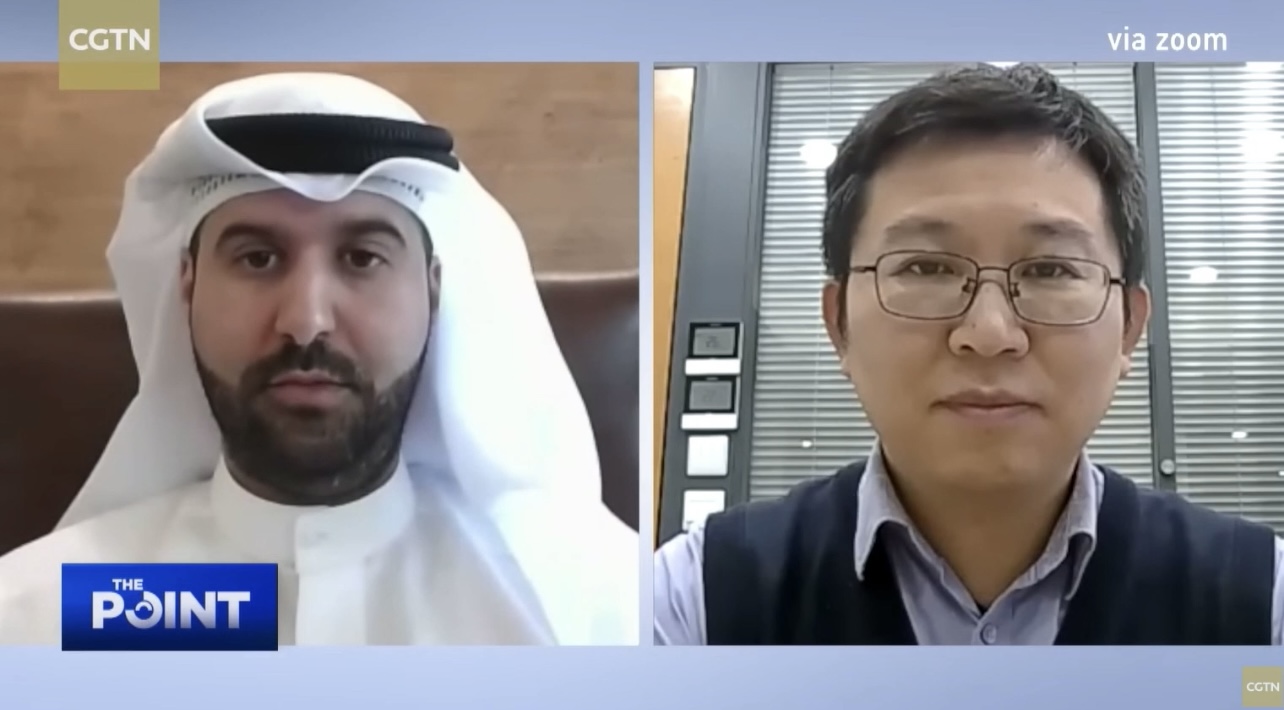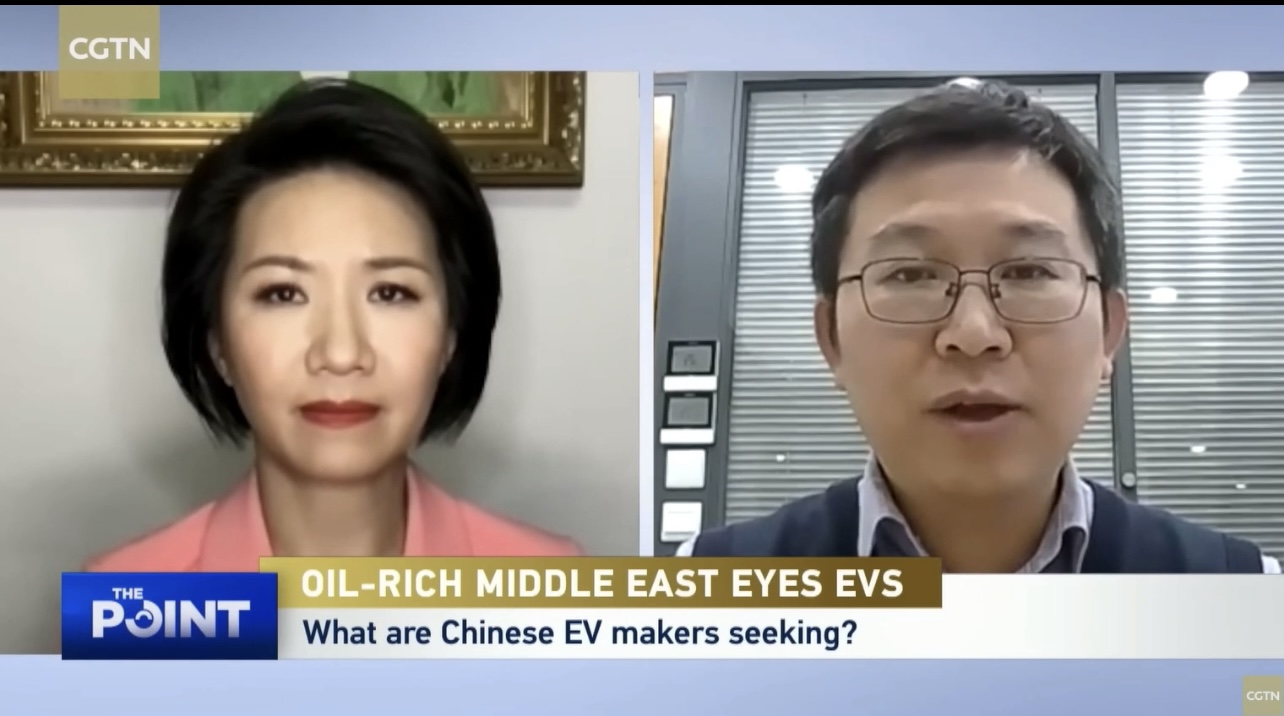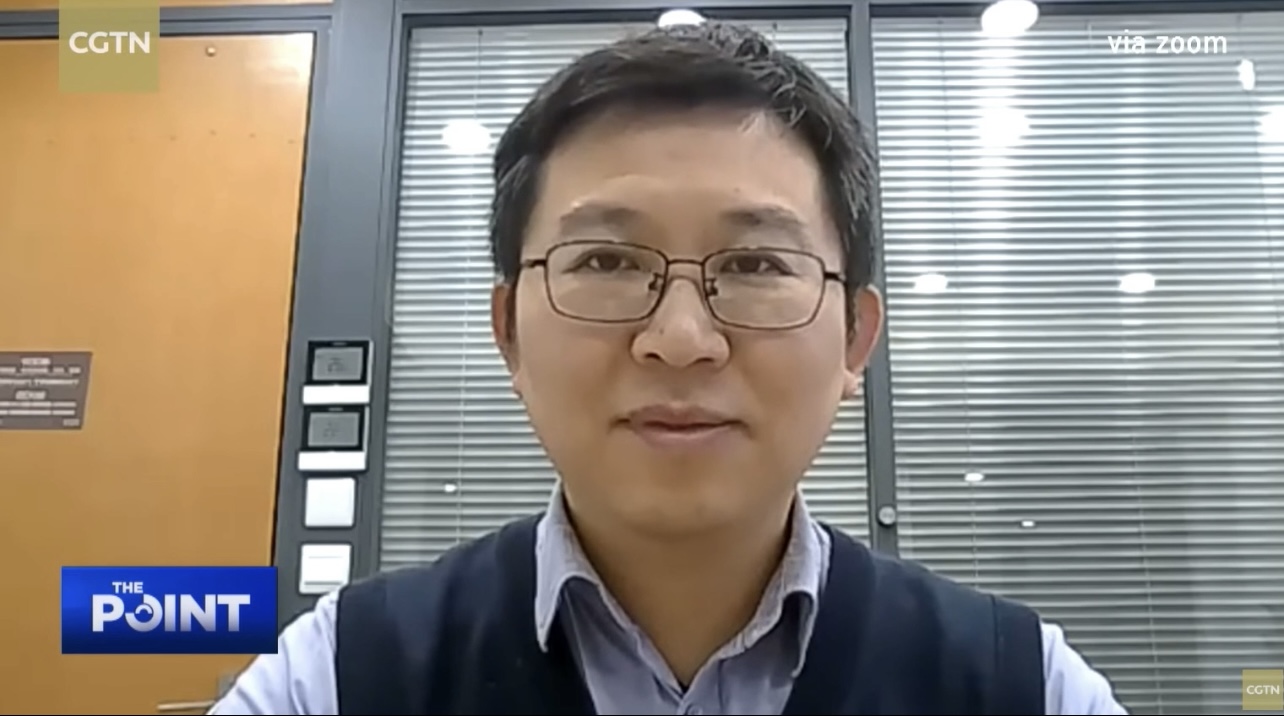Prof. YIN Haitao: On China and the Middle East Strengthen Cooperation in Electric Vehicle Industry 2024-06-24
In a recent interview with CGTN, Professor Yin Haitao, Vice Dean of Antai College of Economics and Management at Shanghai Jiao Tong University (currently serves as Director of the International Center at Shanghai Jiao Tong University) and an expert in Environmental and Energy Economics and Policy, and Dr. Faisal Al Monawer, chairman of KX Power, discussed the growing interest of Middle Eastern investors in the Chinese Electric Vehicle (EV) market and the potential for cooperation between the two regions.

In the interview, Dr. Al Monawer highlighted the importance of green energy transition for Middle Eastern countries, citing economic diversification, environmental concerns, and the creation of new economic opportunities as key drivers. He noted that the Middle East is particularly interested in Chinese EV makers due to China’s vast market potential, technological expertise, and the opportunity to diversify investment portfolios and strengthen bilateral relationships.

Professor Yin Haitao emphasized the significance of the Middle Eastern market for Chinese EV manufacturers, as China’s production capacity far exceeds domestic demand. He stated that China’s leading position in battery and electric car technology makes it an attractive partner for Middle Eastern countries seeking to electrify their transportation systems. Professor Yin also stressed the importance of global collaboration in combating climate change and the economic opportunities presented by the electrification of the transportation sector.
Both experts identified several areas for potential cooperation between China and the Middle East, including infrastructure development through the Belt and Road Initiative, energy cooperation in oil, gas, and renewable energy projects, as well as trade and investment in manufacturing, construction, agriculture, and technology.
As the world continues to focus on reducing greenhouse gas emissions and mitigating the effects of climate change, the collaboration between China and the Middle East in the EV sector represents a significant step towards a more sustainable future. The combination of Chinese technological advancements and Middle Eastern investment and resources has the potential to accelerate the global transition to clean energy and create new economic opportunities for both regions.
Here is the full transcript of the interview:
CGTN: Middle Eastern investors are increasingly interested in Chinese-made EVs. NASA Alahi, director of the Electric Vehicle Innovation Summit, said last year that the EV market will grow at an annual rate of 27% in the UA alone over the next five years. Why are Middle Eastern investors looking East in the EV sector, and what can Chinese EVs offer to the oil-rich region in their green energy transition? I am pleased to be joined from Kuwait by Dr Faisal Al-Monawer, chairman of KX Power, a UK-based environmentally friendly energy supplier, and from Shanghai by Professor Yin Haitao, Vice Dean of Anti College of Economics and Management of Shanghai Jiao Tong University.
CGTN: Dr. Monawer, let me go to you first. We have been hearing a lot of interest from countries, especially Sovereign funds in the Middle East, in embracing projects in green energy transition. Why is such interest important?
Dr. Monawer: Thank you for having me here. Middle Eastern countries, as you know, are increasingly investing in energy or green energy, to be more specific. Transition for several reasons, among which are diversification in the economy, environmental concerns, global trends, energy security, and economic opportunity. To discuss some of them, let’s talk about economic diversification, which aligns more with my expertise. Many Middle Eastern countries have economies that heavily rely on well-known oil and gas exports, and diversifying their energy sources helps reduce dependence on fluctuating oil prices. We have realized that during the last decade, I assume, dramatic fluctuation in oil prices also creates new economic opportunities in the renewable energy sectors. In addition, the economic perspective is pretty important, but environmental concerns are perhaps more reliant as well. The Middle East has experienced environmental challenges like air pollution, water scarcity, and desertification. Transition to green energy perhaps helps address these concerns by reducing greenhouse gas emissions and promoting sustainable energy. But, maybe the most interesting to me is creating job opportunities and, to be more specific, economic opportunities as the umbrella talking here. The green energy transition presents significant economic opportunities like job creation, technology development, and investment attraction. Middle Eastern countries are keen to capitalize on these opportunities to stimulate economic growth and diversification.
CGTN: Professor Yin, let me get your perspective here. How important is the Middle East as a market for Chinese-made new-energy Vehicles, and how are they doing now?
Prof. Yin: Well, as you know, China’s electric vehicle market has been developing rapidly in the last 10 years, especially in the previous three years, when the market exploded. I think any international market is very important to China’s automobile makers because our production capacity is so high that it far exceeds our domestic demand. It is not only the Middle East, Southeast Asia, and the European market that are important to China’s automobile makers. From the perspective of the Middle East, as our guest said, middle east countries also have a desire to electrify their economy, including their transportation system and China’s battery technology, electric car technology, has been leading the market. So, I think investment in such a mature technology battery will achieve a more effective international collaboration mutually beneficial for both parties.
CGTN: Dr. Monawer, why are Middle Eastern funds and investors particularly interested in Chinese EV makers? What specifically are they looking for?
Dr. Monawer: That’s an interesting question. Let me answer it from the Middle East in general. Not specifically to the Sovereign wealth funds, but in general. This can be attributed to several factors: market potential, technology, expertise in China and bilateral relations. Talking about market potential, China is well known now as the largest EV Market in the world, with a rapidly growing demand for electrical vehicles driven by government incentives, mainly environmental policies and consumer preferences. The Middle East invests, or investors even more, recognize opportunities to capitalize on such a vast market and perhaps take part in its growth. Additionally, technology expertise is an important factor. China has emerged as a global leader in EV technology with significant investment in research, development and manufacturing. Middle Eastern investors recognize the value of accessing Chinese expertise in EV technology, battery manufacturing, and perhaps even more related infrastructure to EVs. Perhaps the final point, which I think is critical, is the divergence of investment and bilateral relationships. So, talking about divergent investment, the Middle Eastern countries are looking to diversify their investment portfolio beyond the traditional sectors like oil and gas, which is well known for. Investing in the Chinese EV industry offers diversification, obviously diversification in opportunities and exposure to a high-growth sector with potentially lucrative returns. The final point is the bilateral relationship. I believe it’s important in terms of strengthening economic ties, and the bilateral relationship between the Middle East and China would motivate investment in various sectors, such as the EV industry, and collaborative ventures in Electrical Vehicles can, in fact, enhance trade relations and foster mutual economic benefits as well.
CGTN: Professor Yin, what’s in for Chinese EV makers to receive investments from the Middle East? What kind of opportunities are they looking for? What are Chinese car makers looking for?
Prof. Yin: Global warming is a critical issue for society. Firstly, we must electrify the economy to stop global warming and win the world against climate change. Secondly, we must turn our energy needs into alternative or new energy. When we think about the opportunities for electrifying the transportation system that presents huge economic opportunities, clearly China is leading the industry in many aspects, including the battery industry, intelligentization, etc. So, I think China is trying to develop the electric car industry. We try to catch the opportunity that has been provided by our need to deal with global warming, and at the same time, we need investment from the Middle East, from all around the globe, to further develop our technology, to create a competitive advantage compared to other automobile makers. So, I think that’s valuable for China’s automobile makers.
CGTN: A very important question: What is the potential for cooperation? Are there any specific examples already, Dr. Monawer, that you can share with us?
Dr. Monawer: There are several examples of potential cooperation, I believe. Infrastructure development from this angle, I believe the Chinese Belt and Road initiative presents an opportunity for collaboration in infrastructure development projects across the Middle East, including transportation energy and maybe telecommunications infrastructure, which are all keen to do. Chinese companies can contribute expertise, financing, and technology to support infrastructure development in the Middle East region. And talking about energy cooperation, I think that’s critical because the Middle Eastern countries possess abundant energy resources while, on the other hand, China is the world’s largest energy consumer, so that’s a nice marriage here, I believe. Cooperation in the energy sector, including oil and gas exploration, production, transportation, and investment in renewable energy projects, is critical. For instance, Chinese companies have invested in renewable energy projects in countries like the United Arab Emirates and Saudi Arabia, and now, with our arguably famous prime minister, we’re hoping we’re gonna follow their steps or perhaps even be a leader that similar to what we were 30 years ago and many other years. Regarding trade and investment, which probably is my favourite part here, bilateral trade and investment between China and Middle Eastern countries continue to grow with cooperation in manufacturing infrastructure, particularly construction, agriculture, and technology. Middle Eastern countries offer access to markets, natural resources, and investment opportunities, while China provides capital technology and market access to Middle Eastern products.
CGTN: Many thanks to Dr. Faisal H. Al-Monawer, professor at KU University and chairman of KX Power and Pro, and Yin Haitao, Vice Dean of Anti College of Economics and Management of Shanghai Jiao Tong University. Thank you so much, gentlemen.
About Professor Yin

Professor Yin Haitao is a distinguished professor and the vice dean at Antai College of Economics and Management, Shanghai Jiao Tong University (currently serves as Director of the International Center at Shanghai Jiao Tong University). His research interests include health economics, hospital management, and digital transformation of healthcare. He has published over 100 papers in prestigious international journals and led numerous research projects. Prof. Yin actively participates in policy advisory and industry consulting, contributing to the development and innovation of China's healthcare system. With his outstanding academic background and extensive experience, Dr. Yin is dedicated to promoting the integration of theory and practice to drive the sustainable development of the healthcare industry.






